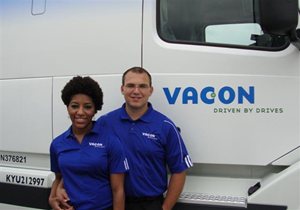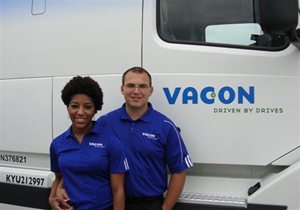Solo driving is great for the loner types. You go when you want, rest when you want, with no one to consider but yourself. However, there are a great many benefits to team driving. You get more miles and more money, and oftentimes you get better treatment and better equipment from the company. You also have someone to keep you company or help you stay awake when the driving gets tough. Team driving can be a scary proposition, though, when you think of two people in that small space. How do you not kill each other? Trust me, I know the feeling.

My wife, Caryn, and I started team driving for Schneider National in the fall of 2006. As a newly wed couple of only 6 months, there were, let’s say, a few adjustmentsthat we had to make. I thought I knew  everything and owned everything, and sharing a cubicle-sized bunk, with a woman no less, was a newexperience for me. I had also had about six months behind the wheel already as a solo driver, and she was fresh out of trucking school, ready to take the road by storm. And what a stormy adventure it was.
everything and owned everything, and sharing a cubicle-sized bunk, with a woman no less, was a newexperience for me. I had also had about six months behind the wheel already as a solo driver, and she was fresh out of trucking school, ready to take the road by storm. And what a stormy adventure it was.
I’m sure you can imagine the many “discussions” we had. What are you listening to? What’s this shoe doing here? What are you taking a picture of now? Did you steal my logbook pen again?! Eventually, we got down to business, figuring out our driving schedules, organizing our belongings, and agreeing upon off time. After a few turbulent months, we made it work. And with a few tips, you can make it work, too.
- Communication. This is probably the most important component of a successful team driving operation. Everything must be talked about. What are your smoking preferences? Who is driving when? How often will you be showering? Having open and honest discussions with each other will solve a lot of problems before they even start. The moment you have an issue with your co-driver, talk about it. Harboring grudges will only make working together a living hell, especially in that tiny little box of a tractor. Remember, communication involves listening as well. Stay open-minded and be willing to compromise. After you both have come to an agreement, stick with it.
- Trust your co-driver. When involved in a situation that required some quick thinking or maneuvering, I felt the need to freak out very expressively, while my wife silently handled it like it was no big deal. I would interpret her lack of reaction as either nonchalance or lack of awareness, so I had no shortage of commands for her to follow to handle the situation, and no shortage of opinions about her seeming lack of urgency. A “discussion” would always follow, almost undoubtedly ending with my wife telling me, “You don’t trust me as a driver.” It is very likely that you and your co-driver will have different driving styles. One is not necessarily better than the other, and side-seat driving attempting to change your co-driver’s seemingly faulty methods just because they are different from yours will always result in conflict. Let your co-driver do his or her thing. As long as you get to your destination with the truck and your person in one piece – that’s all that matters.
- Respect your co-driver. Do we really need to go over this? This tip really involves nothing more than common courtesy. If you borrow your co-driver’s logbook ruler, put it back. When you are finished with the road map, put it away. If you know your co-driver wants to get going in ten minutes, don’t spend thirty minutes in the truck stop shower putting on your makeup (not mentioning any names). Do not cross each other’s boundaries; they are really tight in that cab. Also remember that many of the decisions you make affect both of you. Whether it’s a loved one or just a co-worker, you are both in it together. Respect that.
- Don’t sweat the small stuff (or the big stuff). Everyone makes mistakes, some more costly than others. Maybe your co-driver didn’t put your ruler back, or maybe he or she just backed into someone’s front end. Three times. On her first week on the road (again, not mentioning names). Instead of berating each other over mistakes or inconveniences, help each other. As a team operation, you both are in it for better or for worse. When the “worse” happens, sometimes you have to roll with it. Patience and understanding goes a long way, because we all need it at some point.
As you can see, team driving can be a little challenging. However, by applying these principles, you can make your team driving experience a more profitable and enjoyable one.